Bolivia 19
MAS Strengthens its Majority

MAS Strengthens its Majority in Bolivian Parliament
The second Bolivian political force will be the Citizens’ Community Alliance, of former President Carlos Mesa.
By Redacción Digital | internet@granma.cu
October 24, 2020
Translated and edited by Walter Lippmann for CubaNews.
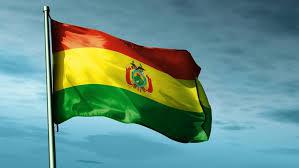
Photo: Taken from the Internet
With 97 percent of the officially counted election records, the Movement Towards Socialism (MAS) consolidated its majority in the Bolivian Legislative Assembly on Friday, reported Telesur, by securing 21 senators and 78 deputies.
The Plurinational Electoral Body (OEP) of Bolivia reported this Thursday that the MAS, of President-elect Luis Arce, obtained 78 of the 130 seats in the Chamber of Deputies, while in the Senate it obtained 21 of the 36 seats.
The Citizen Community Alliance (CC), of former president Carlos Mesa, obtained 35 deputies and 11 senators, to become the second political force of the South American country.
Meanwhile, the Creemos movement, led by former presidential candidate Luis Fernando Camacho, will have four legislators in the upper house and 17 deputies.
With this composition, the Movement Towards Socialism will be able to approve laws and make parliamentary decisions, without having to build political alliances with the opposition.
However, it will have to build agreements with CC and Creemos to designate authorities, approve judgments of responsibilities and even propose constitutional changes, since this requires the approval of two thirds of the Legislative Assembly.
Among those who must be appointed with a two-thirds majority are the ombudsman, the attorney general and the comptroller general.
This Friday, the Supreme Electoral Tribunal (TSE) officially declared Luis Arce, of MAS, to be the president-elect, who obtained 55.10 percent of the valid votes cast in the general elections of 18 October.
In second place was Comunidad Ciudadana, with 28.92 percent; and in third place, Creemos with 13.82 percent of the votes.
The Bolivian Refoundation is Back

The Bolivian Refoundation is Back
The overwhelming absolute majority obtained by the MAS duo spoke loud and clear, and inhibited the possibility of another coup. The Movement Towards Socialism (MAS) also dominated the votes for the House and Senate
 Published: Monday 19 October 2020 | 08:22:21 pm.
Published: Monday 19 October 2020 | 08:22:21 pm.
By Marina Menendez Quintero
Translated and edited by Walter Lippmann for CubaNews.
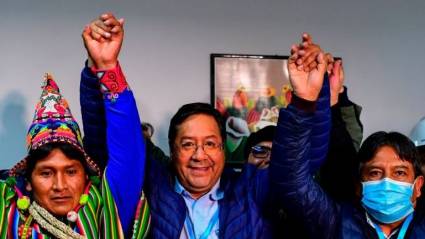
Luis Arce (center) celebrates overwhelming electoral victory Author: AFP Posted: 10/19/2020 | 08:12 pm
Bolivia gave itself the necessary vote to defeat the coup d’état and not leave any gaps that would make another manipulation possible: 52.4 percent of the votes awarded to Luis Arce, compared to 31.5 percent attributed to Carlos Mesa, constitute a forceful absolute majority in favor of MAS that demolishes the calculations of all the polls, according to which the Movement Towards Socialism won “tightly” with a little more than ten percent of the votes, or it was going to a second round definitively.
The Bolivian refoundation is back and that round is now irreversible, although the slow official count by the Supreme Electoral Tribunal has not yet produced results.
The results of the exit polls, made known shortly after midnight on Sunday, are of such weight that they were recognized, half an hour after they were made public, by the usurper Jeanine Áñez herself, when she congratulated the winning couple through a brief message on Twitter and ended the tension of a thick calm.
This was a step – it must be recognized – in favor of a guaranteed stability, first, by the masses of patient and firm voters who waited in long lines to vote, without yielding to the provocations of an armed and police corps that guarded the schools with long weapons after a week, accusing the followers of the MAS of fraud in advance, and feeding the false possibility of a popular uprising that would give them the excuse for repression and violence, as a way of overturning an overwhelming victory of the left, like this one.
Áñez’s statement buried the possibility of that other feared blow and against which the declarations of the TSE, that had previously suspended the usual system of quick counting by which tendencies are offered on the same election night, weighed heavily, with which the population was left in suspense.
After the fourth press conference given by the incumbent Salvador Romero early in the night and his repeated testimony that the day had been exemplary, it was impossible to question the polls that the Jubilee center had carried out, and whose results were later published by Ciesmori -she affirms that she has the backing and credit of the authorities- through the official television channel Unitel.
It was in this way that those who remained “inside” the social networks, met at the stroke of midnight of the unofficial but already unobjectionable triumph, celebrated with modesty in a brief meeting of the MAS candidates and some of its leaders while, from his refuge in Buenos Aires, its leader, Evo Morales, commemorated in the same way an event that he considered “historic, unprecedented and unique in the world”.
“One year after the coup, we recovered political power democratically with the consciousness and patience of the people,” he added.
Sober and without fanfare, Arce also thanked the people in La Paz and ratified his commitment to work and govern for all Bolivians.
“We are going to recover the country’s economy. We have the obligation to redirect our process of change without hate, learning and overcoming our mistakes,” added the former Minister of Economy, who analysts consider the architect of the good performance of the national economy during the mandates of the MAS, when that area registered a sustained growth unique in Latin America that averaged an annual GDP of eight percent.
In 12 months, Áñez’s dismantling management now leaves a Gross Domestic Product that must contract more than six percent this year, in the midst of the worst economic crisis in 40 years. Even taking into account the damage caused by the poorly managed Covid-19 pandemic -another ballast of Jeanine- this picture expresses the mismanagement of a spurious mandate that “governed” for big capital.
However, beyond the well-earned prestige of Arce and his unquestionable gift of agglutinating, Sunday’s vote breathes the conviction of an electorate that, for the most part, has given its support not exactly to a figure, but to a project whose achievements were clearer the more aggressive was the work of destroying them led by Áñez.
Such a conviction, expressed so massively and firmly in spite of so many elements against it – let us remember the previous persecution and demonization of MAS to the point of opening judicial cases against its cadres including Evo – leaves with a sticky nose those who, once again, when looking at Latin America revive the denied assertions of Francis Fukuyama in the 1990s, when he announced “the end of history”.
The lesson must have been taken by the OAS headliner himself, an acolyte of Donald Trump who orchestrated the coup last year, and an enemy of the most puerile progressivism. With less capacity for resignation than Áñez, Luis Almagro waited for Monday morning to arrive to take the bitter pill.
“The people of Bolivia have expressed themselves at the polls. We congratulate @LuchoXBolivia and @LaramaDavid wishing them success in their future endeavors,” he wrote on Twitter. “I am sure that from democracy they will know how to forge a bright future for their country.
Contestant Carlos Mesa also had to embrace the inevitable, considering that the difference was too great for there to be any change. “It is an outcome that we accept,” he said.
A pending issue and of no small consequence will be the reaction of the armed forces, which in an artful way supported the revolt against Morales last year?
But the Latin American and Caribbean reversion, thought out and raised from the centers of power, has suffered another defeat. After the return of Peronism to the Argentine government, the return of Masismo indicates that, as much as it still has to perfect itself and learn, the model that takes man as the center as an alternative to that other system that breathes at the rhythm that the market inhales and exhales has not failed.
On the contrary, the neo-liberal execution shows today its shortcomings in the repeated popular mobilizations that are shaking countries like Colombia and Chile.
The Bolivian masses have shown that despite the injustice and the dirty war, the possibility of changing the status quo remains open if there is clarity, consciousness and the ability to resist.
Horizontal Victory
The exit polls carried out by the Jubilee Foundation and the Ciesmori company show a victory for MAS in both chambers of the National Assembly.
According to their counts, the MAS would obtain 19 seats in the Senate out of the 36 it has, while two seats would be in dispute between that political force and the Citizens’ Community (CC) in Potosi and Santa Cruz, reported Telesur.
According to Jubilee information, MAS won five of the country’s nine departments: La Paz, Cochabamba, Potosí, Oruro and Pando, while Carlos Mesa’s Citizen Community won in Chuquisaca, Beni and Tarija. Finally, Creemos’s candidacy, led by Luis Fernando Camacho (who won 14 percent of the votes in the presidential race), would be the winner in Santa Cruz.
Greetings from the left
Politicians from the Latin American and Caribbean left immediately spoke out on the social network Twitter:
Congratulations to #MAS, which has recovered at the polls the power that was usurped by the oligarchy, with the complicity of the #OAS and the imperial guide. #Cuba shares joy for the triumph of #LuisArce. The Bolivarian ideal is reborn. (Miguel Díaz-Canel Bermúdez, Cuban President)
I congratulate the Bolivian people for having restored democracy. Congratulations to Luis Arce and my friend Evo Morales who after a difficult year can see the popular vote respected. (Luiz Lula da Silva, former Brazilian President)
Congratulations to Lucho Arce and David Choquehuanca who, together with Evo, built a great popular triumph in Bolivia. The happy Patria Grande. (Cristina Fernández, Vice President of Argentina)
Great Victory! The Bolivian people, united and conscious, defeated with votes the coup d’état that they gave to our brother Evo. Congratulations to President-elect Luis Arce, Vice President David Choquehuanca and our Indian Chief of the South @evoespueblo. Jallalla Bolivia! (Nicolás Maduro, President of Venezuela)
Can the Left Win an Election?

Can the Left Win an Election Without an Organized People?
 By Hugo Moldiz Mercado.
By Hugo Moldiz Mercado.
He is a Bolivian lawyer, communicator, university professor, researcher, Master in International Relations and correspondent for international news agencies. He has advised some commissions of the Bolivian Constituent Assembly.
April 28, 2020
Translated and edited by Walter Lippmann for CubaNews.
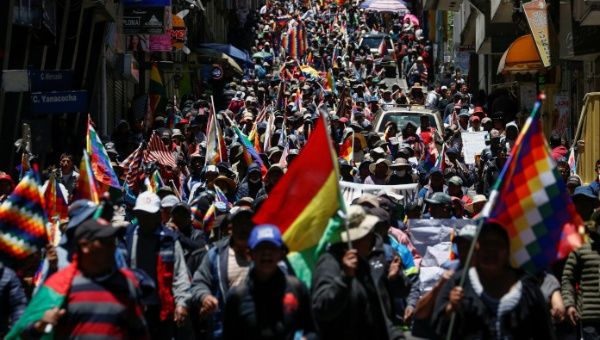
Demonstrations in La Paz protesting the coup d’état against Evo Morales. Photo: Reuters.
In what way does the left have a chance of triumphing in representative (bourgeois) democratic elections? Is it an efficient and effective electoral strategy, regardless of the relation of forces between the dominant and subordinate classes, the predominant, even the only one, for a leftist candidate to be able to attract aa high percentage of the population and crown himself as the winning formula?
Is it a general political strategy, with its political-electoral correlate, that builds “from below” a favorable relationship of forces in the social struggle, to then translate it into votes greater than those received by the right-wing candidates, leading to a political-electoral victory?
It is evident that much reflection can be made on each of the questions posed. It is even possible to incorporate other questions in the same direction and make the issue even more complex. However, at the risk of appearing too simple, let us try some criteria.
The first is that the ways of doing electoral politics depend on the general political situation of the time. There is an intimate relationship between the political characteristics of a certain general historical period and the characteristics of a specific electoral situation.
A correct electoral strategy that ignores the political features of the period and the situation, however attractive it may be in the eyes and ears of the people, will not mechanically give the expected result: triumph. On the contrary, an electoral strategy based on the people as a social force with an effective territorial presence will be capable of convincing and attracting various fractions of the petty bourgeoisie and other backward sectors of the popular camp to lean towards a leftist candidate.
Second, it is true that the conditions and tools existing in this second decade of the 21st century are different, even radically different, from the conditions and tools that the left developed and used to conquer electoral victories, first, and install governments of its ideological-political court at the end of the 20th century and the beginning of the 21st century, later.
There is no doubt that the role of the media and social networks – as ideological state apparatuses – has an increasingly greater degree of influence in the configuration of electoral results. Whether or not it is predominant depends on the type of social formation, the nature of the class confrontation at the time, and the nature of the political strategies of the actors.
But neither the first nor the second criteria (forms of electoral participation, on the one hand, and conditions and tools, on the other), modify in substance the main aspect of representative democracy. That system, on the basis of the fetish of “one citizen, one vote”, is generally structured to ensure the reproduction of the type of capitalist state in the long term.
Except for a certain relative autonomy of the State from its dominant classes, in moments of general crisis, the left can take over the government, while previously building from “below” a relationship of favorable social and political forces.
Based on these two considerations, it is good to point out that, as a general rule, the left has been the winner of electoral competitions when its electoral strategy has succeeded in establishing or expressing the trend of social availability of the subordinate classes.
In other words, to build and condense through them a present state of mind and subjectivity of a social majority that is unwilling, for various reasons, with the government of the moment, and that is inclined to change through an option would answer the current state of affairs.
It is when the general crisis or even the indisposition with the government of the moment is made to lean to the side of a popular project. In other words, it is not only the candidate’s attributes that win over most voters but, above all, when that candidate or party synthesizes the “common sense” of what the people want and what they are fighting for at that moment.
However, this “common sense” does not arise spontaneously, even more so when the majority of the state system (repressive apparatus and ideological state apparatus) are against a leftist candidacy. It is rather the result of a patient and skillful construction of relations of forces favorable to change. This requires a conscious leadership. It is when, without abandoning modern techniques of inducing people to vote, the fragmented social tissues are gradually being articulated into a single large, strong and vigorous fabric.
The right-wing options have in an otherwise always expensive election marketing campaign the predominant way to win an election. This is because the whole state apparatus (repressive and ideological) works for their benefit. But the left, even if it is reformist, is obliged to find, in the organized strength of the people, the main source of its strategy, its tactics and its tools of triumph.
Moreover, even if the left obtained an electoral victory as a result of a high level of rejection by the population of the parties of the right, due to an unprecedented generalized crisis (ideological crisis of the classes and fractions of the block in power), its degree of stability and the possibilities of deepening its governmental measures will be very limited to face the medium and long-term challenges if it does not count on the organized people as a social force.
Does that mean that the left should abandon the use of modern techniques, such as social networks, to face an electoral competition? No, it doesn’t mean that. The progressive and leftist forces should use it to the fullest, but they should be convinced and not call themselves “self-deception” that their hypothetical victory was due to other, larger causes.
Only the naive or those who are unfamiliar with the laws of political operations are prone to be deceived by certain technical or tawdry electoral advisors who claim victory for a leftist candidate. In fact, a measurement of the level of impact of the battle on social networks will show that right-wing alternatives are the biggest beneficiaries.
The territorial work, the grassroots work, to organize the people and prepare them for a victorious battle that will translate into a vote will never be replaced by the forms of political incidence “from above”. These techniques complement, yes, but do not replace the consciousness and organization made into a material force.
For that, perhaps it is good to differentiate, as René Zavaleta did, between democracy as a mere aggregation of votes and democracy as self-determination. The sum of votes in a representative democracy can give the government, but not lay the foundations for the construction of a power different from the existing one.
This implies that a triumph within representative democracy for the right is in its condition of possibility. This is because it does not alter in any way the existing power relations. But for the left, it is insufficient since it is supposed to want the construction of power different from the capitalist one.
For the left to triumph in elections of representative democracy, it must first constitute itself as the leader of society, and this is only possible when the people become historical subjects who install their “common sense” as predominant over others.
In synthesis, it is not “from above” that the left wins the elections with the sole use of modern techniques of political incidence, but, above all, with the capacity to constitute itself “from below” as a political reference and as a part of the historical subject.
The left wins elections not only because of the charisma of a candidate, which is important but insufficient but also because of the benefit it derives from that space of representative democracy, which is not its own, to build itself as a power (hegemony translated into political practice) before becoming a government. Those are the lessons of history and that is the challenge of the present hour.
Bolivia Suspends Elections until Further Notice


Bolivia Suspends Presidential
Elections until Further Notice
The Bolivian de facto government declared total quarantine this Saturday, taking effect from Sunday and will last 14 days, as an extreme measure to combat the new coronavirus pandemic.
March 22, 2020
Translated and edited by Walter Lippmann for CubaNews.
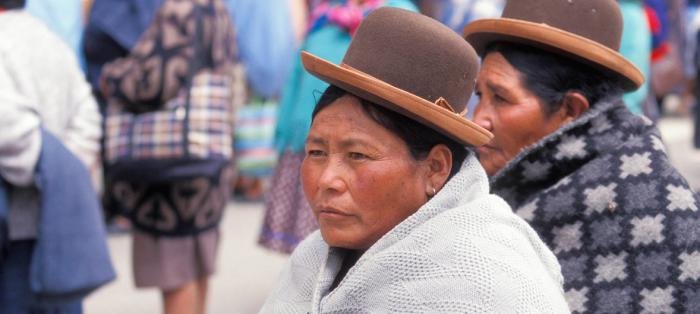
Photo: Taken from the Internet
The Bolivian Supreme Electoral Tribunal (TSE) announced on Saturday the suspension of the election calendar due to the total quarantine decreed by the de facto government in the face of the new coronavirus, and therefore the presidential elections scheduled for May 3.
The President of the Supreme Electoral Court, Salvador Romero, said that the new date for the elections should be set “with technical support”. He reiterated that it should be made taking into account scientific assessments on the evolution of the pandemic. “It must be accepted without bias in favor or against any political organization or candidate,” he added.
In its statement, the TSE also expresses its commitment to resume its activities as soon as the minimum conditions are met.
“We declare our willingness to continue the broad and pluralistic dialogue with all political organizations participating in the 2020 process, as well as with the other branches of government, so that in a framework of consultation and unity of all Bolivians, we can define a new date for the voting day of the 2020 general election,” the TSE’s statement states.
For the time being, health authorities reported that 19 cases of infection and no deaths have been confirmed in the country.
In the run-up to the elections, the Movement Towards Socialism (MAS) is the favorite to win the presidency, vice-presidency and most of the seats in the Plurinational Assembly.
Coup Govt Seeks to Bankrupt State Airline

Coup Govt Seeks to Bankrupt Bolivian State Airline
March 3, 2020
Translated and edited by Walter Lippmann for CubaNews.
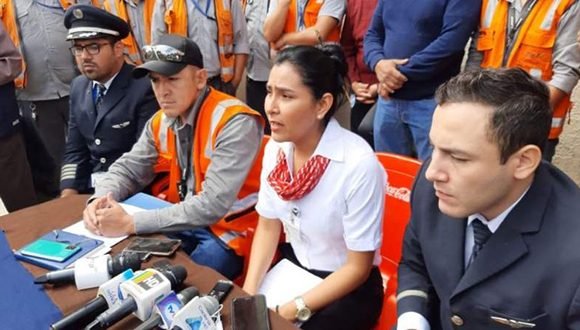
BoA workers declare a state of emergency. Photo: Radio Kausachun Coca.
Base workers of the Bolivian Aviation Company (BoA) declared a state of emergency after not being attended by the Ministry of Public Works, and asked to hold a meeting with President Jeanine Añez to learn about the situation of the state company.
The representative of the BoA collective, Francia Gonzales, expressed her fear and that of the other workers of the airline that the same pattern that occurred with the companies Lloyd Aéreo Boliviano (LAB) and Aerosur, which went bankrupt last decade, will be repeated.
“This is precisely the reason for this mobilization. Our company is gradually going into decline and this is the concern of all the workers. Many of them, former officials of LAB and Aerosur, are seeing the same steps, the same as what has happened with other companies, we are focused on the same path,” emphasized Gonzales.
This Tuesday, BoA’s president, Juan Carlos Ossio, denounced a loss of at least $50 million during the last four administrations of the Movement Towards Socialism (MAS).
“Boliviana de Aviación does not escape the logic that the country has been suffering systematically. MAS never tires of saying that it delivered an armored economy, and as we are seeing little by little, BoA is just another one of the badly managed companies that is showing a loss of more than 50 million dollars,” said Ossio.
The manager of the state-run company also considered that the rank and file workers are in a “plot”. In response to this statement, Gonzales said that the state airline workers “are not in a plot, but that the plot is coming from management” by cutting BoA’s schedule.
“At no time do we as workers intend to stop operations, that would be a plot. The plot we are seeing is from management making bad decisions in cutting routes, cutting catering and other types of services,” he added.
Claudia Mallón, a deputy from Unidad Demócrata (UD), denounced that the state-owned airline BoA failed to receive more than 79 million Bolivians (Bs) due to the reduction of frequencies as determined by the airline’s manager and the “complicit” silence of Public Works Minister Iván Arias.
Evo Denounces Manouvers Against MAS

Evo Morales Denounces Maneuvers of
the De Facto Government Against MAS
The former president of Bolivia, Evo Morales, made this Tuesday, through his official Twitter account, a call to the international community to accompany the Bolivian people in the upcoming elections.
March 4, 2020
Translated and edited by Walter Lippmann for CubaNews.
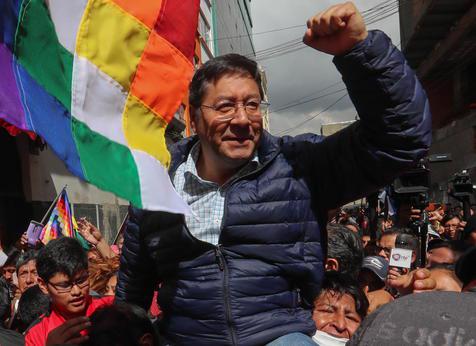
Thousands of people who support the Movement Towards Socialism joined to register the Arce-Choquehuanca binomial for the May 3 elections. Photo: ANSA
The former president of Bolivia, Evo Morales, made a call to the international community to accompany the Bolivian people in the upcoming elections through his official Twitter account on Tuesday.
Morales announced that the coup leaders will try to disqualify the candidates of the Movement Towards Socialism (MAS) before May 3rd.
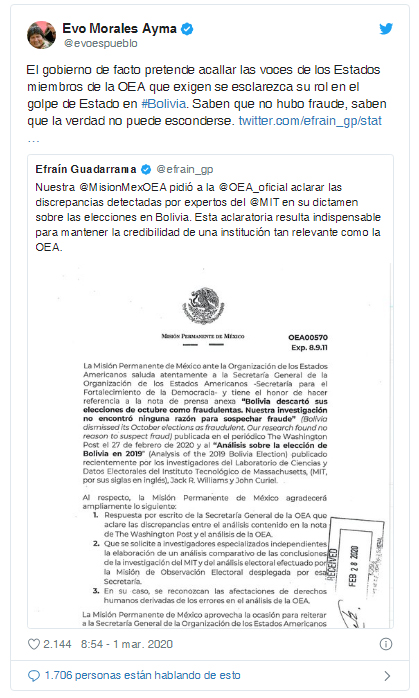
According to a survey released by the Bolivian TV channel ATB, MAS, which places former Economy Minister Luis Arce as a candidate for President and former Foreign Affairs Minister David Choquehuanca as Vice President, at a 32.6% voting intention.
Then comes Comunidad Ciudadana (cc), with 19.2%, which again presents Carlos Mesa as a candidate for President, and Gustavo Pedraza to be elected Vice President.
In the poll, the Juntos alliance also took a position, led by the self-proclaimed interim president, Jeanine Áñez, and Samuel Doria Medina, who accumulated 18.2%.
If these figures are repeated during the official vote, a second round of voting should be held. It is required that a candidate must have more than 50% of the votes or 40% with a 10-point lead over the runner-up to win directly.
Jeanine Áñez’s Campaign Stained

Drug Narcojet Arrested in Mexico Stains Jeanine Áñez’s Campaign
February 25, 2020
Translated and edited by Walter Lippmann for CubaNews.
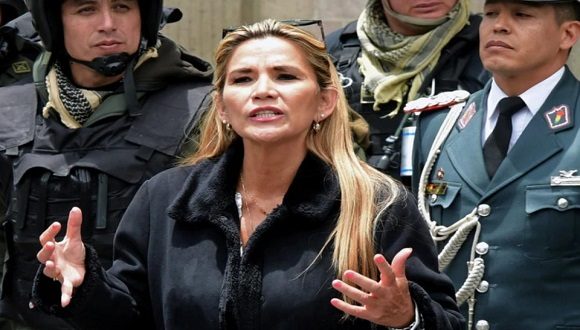
Jeanine Áñez presides over a de facto government in Bolivia, following the coup d’état against Evo Morales last November. Photo: Rebelión.
On Tuesday, it was revealed that the aircraft arrested in Mexico last January, coming from Guayaramerín, Bolivia, belonged to the Jalisco cartel and was supposed to finance the campaign of the de facto president of that South American country, Jeanine Añez.
As soon as the complaint about the arrest of the “Narcojet” on January 28 was made public, government minister Arturo Murillo was quick to say that “the drugs were loaded in the Chapare”. Days later, in the face of the rain of evidence, he had no choice but to admit that the cocaine came from Guayaramerín, a province bordering the lands of the de facto president’s family.
“The drug was on the plane without any method of concealment. It is clear that in the place where the cocaine was taken on board, there was no control whatsoever,” a judicial source commented to the Argentine newspaper La Nación. This means that the Bolivian arm of the Jalisco cartel had the protection of the police and the army. The accumulation of evidence complicating the de facto government led former presidential minister Jerjes Justiniano to ask for the resignation of government minister Arturo Murillo.
According to the newspaper La Nación, the aircraft that took off from Guayaramerín had a U.S. license plate (registration N18ZL GLF3).
A witness revealed that the drug belonged to the Jalisco cartel and that it was supposed to finance Jeanine’s campaign. In addition, a confidential informant testified that the profits from the transaction of 1,000 kilos of cocaine destined for the United States were to cover the costs of the campaign of Jeanine Añez Chávez, a senator and current self-proclaimed president of Bolivia.
The media, whose task has been reduced to shielding (protecting) the image of the self-proclaimed, swept under the rug Jeanine Añez’s family links to drug trafficking. The self-proclaimed woman is married to Héctor Hincapié, a well-known Colombian politician who is under investigation for his ties to the Cali cartel, and is the aunt of Carlos Andrés Añez Dorado, who was arrested in Brazil with half a ton of cocaine.
(With information from Primera Línea)
Bolivia – Report “Finds Out” What We All Knew

Report “Finds Out” What We All Knew: There Was No Fraud in the Elections Won by Evo Morales
Electoral integrity specialists Jack Williams and John Curiel of the MIT (Election Data and Science Lab), concluded that “there is no statistical evidence of fraud” in Bolivia, as denounced at the time by the OAS.
By Raúl Antonio Capote | internacionales@granma.cu
February 28, 2020
Translated and edited by Walter Lippmann for CubaNews.
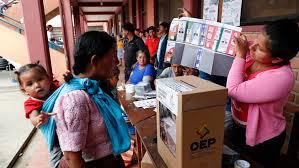
Photo: Taken from the Internet
The Washington Post on Thursday published an analysis by electoral integrity specialists Jack Williams and John Curiel of the MIT (Election Data and Science Lab), which concludes that “there is no statistical evidence of fraud” in Bolivia, as the Organization of American States (OAS) denounced at the time.
“On the contrary, it is highly probable that Evo Morales passed the ten percentage point mark in the first round,” the report states.
After the results of the MIT investigation were published, Evo Morales declared from his Twitter account that this is “one more evidence of the monumental theft that Mesa, Áñez, Camacho and Almagro did to all Bolivians.
According to The Washington Post, specialists Jack Williams and John Curiel indicated that according to their studies and the results that were released in preliminary form by the Bolivian Electoral Tribunal, the Movement towards Socialism party (MAS) would have obtained at least 10.49 percentage points more than the opposition candidate Carlos Mesa.
Mexico announced that it will demand that the OAS “clarify and explain the deficiencies in its report. In this sense, a third party will be formally requested to carry out a comparison of both studies and elucidate the discrepancies.
Bolivian Golpistas Want Lithium Privatization

MAS Presidential Candidate Denounces Lithium Privatization as a Target for Coup in Bolivia
Former Bolivian economy minister and presidential candidate for the Movement towards Socialism, Luis Arce, denounced on Wednesday that the privatization of lithium is one of the objectives pursued by those who perpetrated last year’s coup d’état.
—————————————————————————-
Author: Redacción Digital | internet@granma.cu
February 26, 2020 14:02:29
Translated and edited by Walter Lippmann for CubaNews.
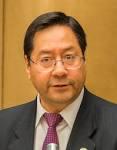
Luis Arce, denounced that the privatization of lithium is one of the objectives pursued by those who perpetrated the coup d’état:
Former Bolivian economy minister and presidential candidate for the Movement towards Socialism, Luis Arce, denounced on Wednesday that the privatization of lithium is one of the objectives pursued by those who perpetrated the coup d’état last year.
In his Twitter account, Arce stated that “(…) the coup d’état was not against the Indian but because of lithium. It was designed by transnationals interested in its privatization along with gas (…)”.
This denunciation, which reiterates those made previously by former president Evo Morales, comes in response to the call for transnationals to invest in Bolivian lithium.
Lithium is considered the energy of the future, because of its properties and use in the manufacture of batteries for electronic effects.
Bolivia has 70 percent of the world’s proven reserves of this mineral (around 21 million metric tons), most of which are in the Uyuni salt flats, in Potosí.
During the Morales government, lithium production began to be industrialised, with the aim of generating 4.5 billion dollars a year for the country’s development.
Disqualification of MAS Candidates?

Disqualification of MAS Candidates Would Aggravate Bolivia’s Political Crisis
The President of the Bolivian Electoral Tribunal (TSE), Salvador Romero, denied on Wednesday that the TSE disqualified the candidacies of former President Evo Morales and former Foreign Minister Diego Pary in the general elections of May 3.
——————————————————————————-
Author: Granma | internet@granma.cu
February 19, 2020 22:02:43
Translated and edited by Walter Lippmann for CubaNews.

According to the electoral calendar, the disqualified candidates must be disclosed on February 23, not before, but a possible disqualification of the mas’s proposals could aggravate the political crisis of the South American country. Photo: TELESUR
The President of the Bolivian Electoral Tribunal (TSE), Salvador Romero, denied on Wednesday that the TSE had disqualified the candidacies of former President Evo Morales and former Foreign Minister Diego Pary in the general elections of May 3.
The local newspaper El Deber published yesterday that the TSE had disqualified both candidates and cited sources from the Movement Towards Socialism (MAS) as the source of the information, reported Prensa Latina.
Romero explained at a press conference that the electoral body has not made any decision on the contested candidacies, and that the information will be made public in accordance with the electoral calendar.
The candidacies of Morales and Pary, aspiring senators from the departments of Cochabamba and Potosi, respectively, are under observation for failing to comply with the requirement of residence in the country for a minimum uninterrupted period of two years.
The TSE’s decision regarding the MAS representatives is expected amidst constant complaints of non-compliance with laws to keep them out of the electoral race.
In previous days, this political organization issued a statement, in which it questioned the decision of the electoral body to submit to a resolution the approval or not of the presence of the candidates observed on the ballots, which it assured was due to political reasons and not due to technical or legal reasons.
Subscribe to Blog via Email
| M | T | W | T | F | S | S |
|---|---|---|---|---|---|---|
| 1 | 2 | 3 | 4 | 5 | 6 | 7 |
| 8 | 9 | 10 | 11 | 12 | 13 | 14 |
| 15 | 16 | 17 | 18 | 19 | 20 | 21 |
| 22 | 23 | 24 | 25 | 26 | 27 | 28 |
| 29 | 30 | 31 | ||||

You must be logged in to post a comment.